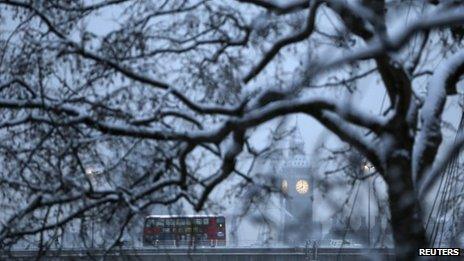Time to think
- Published
- comments

Ask me for the most important broadcast on the BBC each day and my answer is a moment of silence.
It comes a second before six o'clock each evening on Radio 4, between the Westminster chimes and the heavy cracked bong of Big Ben.
This tiny scrap of what might usually be dismissed as dead air speaks louder than all the declamatory brass and frantic graphics of contemporary news broadcasting. It subtly informs listeners that this is a bulletin that values the time to think.
The news business trades on immediacy, but the preoccupation with now is pervasive. I am as guilty as anyone in feeling compelled to check the headlines, latest sports score, Twitter, Facebook, the FTSE, emails and texts in the tiniest gaps during my waking hours.
Those moments when the mind might once have been allowed to daydream and drift, to ponder and contemplate, are filled with urgent checking and responding.
This may give an impression of purposeful activity but, if I am honest, is too often the irrational behaviour of a creature terrified of being found behind the curve.
An article in the New York Times by the biologist Neil Shubin, external last week employed a glorious phrase to describe this phenomenon: he wrote of how humanity's increasing need to communicate and trade had led to an "ever-finer parsing of the moments of our lives".
He contrasts this "need to segment a day into milliseconds" with the biological fact that "virtually every part of us - all our organs, tissues and cells - are set to a rhythm of day and night."
Our bodies are designed for a routine conducted in simple time: two beats in the bar, up at dawn and down at dusk. But modern life moves to a syncopated, insistent and incessant beat.
There is little opportunity to stand still, almost no pause in this unremitting daily dance.

I am not the only one who worries at seeing meditation and reflection squeezed out of modern life. Professor David Levy from Washington University gave a talk a few years ago in which he asked why it was that, despite remarkable tools to automate information processing, "we have less time to think than ever before."
In his presentation, external, Levy argues that technological devices designed to connect us also dis-connect us, crowding out "slow time activities" such as "reflection, play and long-term love relationships."
There is a counter-argument to this demand for more time to reflect. In his book Thinking, Fast and Slow, external, the Nobel Prize winning professor Daniel Kahneman describes the two different ways the brain forms thoughts:
System 1: Fast, automatic, frequent, emotional, stereotypic, subconscious
System 2: Slow, effortful, infrequent, logical, calculating, conscious
He argues it would be a mistake to assume that logical thought somehow trumps automatic reaction. System 1 thinking is often highly sensitive to subtle cues and is, after all, the source of the "fight or flight" response that kept our ancestors alive.

Malcolm Gladwell goes further. In his book Blink, external, he suggests we live in a society dedicated to the idea that we should spend as much time as possible in deliberation. "As children, this lesson is drummed into us again and again: haste makes waste, look before you leap, stop and think. But I don't think this is true."
Gladwell argues that there are lots of situations when instant judgments are better than considered thought. "I think it's time we paid more attention to those fleeting moments," he says, suggesting a general policy of intuition would result in a happier world.
I am not sure I agree. We may all, at times, be too quick to dismiss the value of first impressions and snap decisions. But my concern is that System 2 thinking is being crowded out by the cult of immediacy.
Contemplation requires time and space, commodities increasingly sacrificed on the altar of now. In hectic lives overflowing with demands for instant response, reverie is too often banished.
The pipe may no longer be fashionable, but the pipedream cannot be exiled with it. We need to find the places and opportunities where we can muse and mull, ponder and daydream.
The few moments of radio silence that precede the six o'clock and midnight news bulletins on Radio 4 are a vital defence against the noisy evangelists of now.